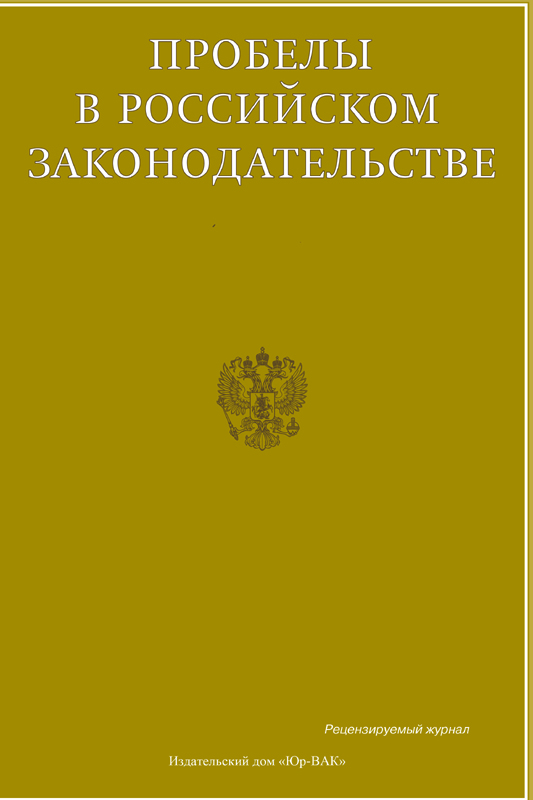Peculiarities of Formation of Social Intelligence and Decision-Making Strategies of Employees of the Internal Affairs Bodies at the Courses of Professional Development
- 作者: Teuvazhukov A.K.1
-
隶属关系:
- North Caucasus Institute for Advanced Studies (branch) of the Krasnodar University of the Ministry of Internal Affairs of Russia
- 期: 卷 15, 编号 4 (2022)
- 页面: 100-104
- 栏目: Articles
- URL: https://journals.eco-vector.com/2072-3164/article/view/531583
- ID: 531583
如何引用文章
详细
The purpose of this study was to study the features of the formation of social intelligence among police officers and its influence on the decision-making strategy. The ways in which advanced training courses affect the development of these qualities are considered. The professional activity of police officers consists mostly in interacting with people and communicating with them. And the task of law enforcement officers is the ability to build such social communication that will allow you to communicate correctly, clearly and informatively with your interlocutor. This affects the success of the implementation of the goals and tasks set for the employee. It has been established that the formation of social intelligence among police officers is one of the important factors for successful professional activity. Social intelligence includes social and communicative competence, observation, empathy, self-control, the ability to make adequate and timely decisions in situations of exposure to various objective and subjective factors associated with the presence of risk, lack of time, resources, uncertainty and inconsistency of information, multitasking, extremeness activities, etc. Social intelligence is formed under the influence of training, education, communication and activity. Its spokesman is the self-determination of the individual, the totality of acquired knowledge about social reality, the ability for social perception, interaction and adaptation to the changing conditions of professional activity. An important indicator of social intelligence, many researchers call psychological stability, which helps police officers to adequately respond to stressful factors and make the right and informed decisions. It is concluded that the level of emotional intelligence of an internal affairs officer contains significant opportunities that affect the success of the tasks. In particular, it has a positive effect on the decision-making strategy, and this is exactly what needs to be specially trained using the entire arsenal of tools available in the educational organization. Decision-making is a profiling quality, which is an important condition for optimizing professional activity and the extreme and critical situations that develop in it.
全文:
作者简介
Aslan Teuvazhukov
North Caucasus Institute for Advanced Studies (branch) of the Krasnodar University of the Ministry of Internal Affairs of Russia
Email: gedmur7@gmail.com
senior lieutenant of police, lecturer at the Department of Fire Training Nalchik, Russia
参考
- Ashkhotova L.A., Yarychev N.U. Principles of improving the communicative mobility of employees of internal affairs bodies studying at the Institute for Advanced Studies // Pedagogy. Questions of theory and practice. 2019. V. 4. No. 3. pp. 73-78.
- Basova V. M. Formation of the social competence of the individual // Bulletin of the Kostroma State University named after N. A. Nekrasov. Ser. Pedagogy. Psychology. Social work. Juvenology. Socio-kinetics. 2008. V. 14, No. 4. pp. 107-110.
- Dottuev T.I. The use of dynamic learning in the system of advanced training for the development of emotional-volitional self-regulation among police officers // World of Science, Culture, Education. 2020. No. 3 (82). pp. 294-295.
- Kamneva E.V. Manifestations of professional deformation of the personality of employees of internal affairs bodies // Akmeologiya. 2011. No. S3. pp. 124-127.
- Lazurenko E.A. To the question of the development of the concept of "emotional competence" in psychology // Science Review. 2015. No. 1 (11). pp. 116-123.
- Lenkov S.L., Rubtsova N.E. Vocational education of employees of internal affairs bodies // In the collection: Vocational education of employees of internal affairs bodies. Pedagogy and psychology of official activity: state and prospects. Collection of scientific works of the II International Conference. Reviewers: I.N. Medvedev, A.S. Osipov. 2018. pp. 314-318.
- Marchenko E.M. Vocational and pedagogical training of heads of faculties and courses on work with personnel: the content and results of experimental work // Bulletin of the Tver State University. Series: Pedagogy and psychology. 2019. No. 2 (47). pp. 237-242.
- Morozov V. A., Fedulov B. A. Formation of managerial competence of the future police officer in the process of professional training // Actual problems of combating crimes and other offenses. Barnaul, 2014. No. 12. Ch. 2. From 128-130.
- Strelnikova Yu.Yu., Pashechko E.B., Shakhmatov A.V. Features of social intelligence and decision-making strategies among employees of internal affairs bodies // Applied Legal Psychology. 2021. No. 3 (56). pp. 30-39.
- Fedulov B.A., Morozov V.A., Levchenko A.A. Directions for improving the management of the process of professional development of police officers // Psychopedagogy in law enforcement agencies. 2018. No. 3 (74). pp. 43-47.
补充文件








